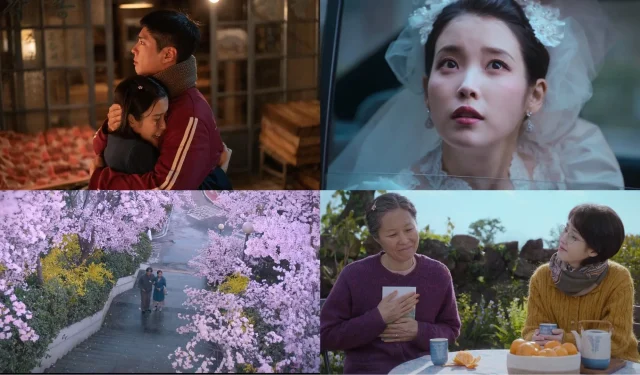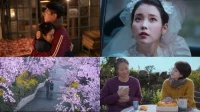The highly anticipated Netflix series When Life Gives You Tangerines, featuring a stellar cast including IU, Park Bo-gum, Moon So-ri, and Park Hae-joon, concluded with its final four episodes on March 28, 2025. This poignant drama weaves a rich narrative that delves into themes of resilience, community, and the intricate nature of human connections, all set against the breathtaking vistas of Jeju Island.
At its core, the series offers a profound look into love, persistence, and the essence of humanity. Spanning six decades, it follows the intertwined lives of Ae-sun and Gwan-sik, beginning in the 1960s and taking viewers on an emotional journey filled with personal dreams battling societal expectations.
When Life Gives You Tangerines is an engaging watch for all audiences, as it reflects universal struggles through the experiences of Ae-sun, Gwan-sik, and the ensemble cast. The series poignantly captures the sense of nostalgia for the homes we leave behind as adulthood beckons, yet the yearning for those past connections never truly fades.
“To my love, from when we were nine until now, thanks to you, my life has been a spring every day. This book wouldn’t exist if it weren’t for you. Until the spring we meet again, I’ll live as though every day is spring.”
Exploring the Depths of When Life Gives You Tangerines
The narrative revolves around Ae-sun, portrayed by IU, a spirited young woman aiming to break free from her traditional roots. Her mother, a dedicated haenyeo (female diver), embodies the challenges faced by Jeju Island women, who often feel constrained by societal norms that value men over women.
As Ae-sun navigates her aspirations for the future, her relationship with Gwan-sik (played by Park Bo-gum) becomes central to the storyline. Gwan-sik’s unwavering support and silent resilience provide a grounding force for Ae-sun as they experience the complexities of love and companionship.
The series is rich in symbolism, with the tangerine representing the duality of life’s experiences. The fruit’s contrasting flavors symbolize the characters’ triumphs and tribulations. Furthermore, the omnipresent sea serves as both a nurturing source and an unpredictable element, paralleling the societal challenges the characters face. The changing seasons further reflect the evolution of Ae-sun and Gwan-sik’s relationship, with spring symbolizing rebirth and winter embodying challenges that lead to self-reflection.
IU delivers a nuanced performance as Ae-sun, capturing the nuances of strength and vulnerability in her character. Her portrayal resonates deeply with viewers, illustrating the internal conflict between personal desires and familial obligations.
Pivotal to the narrative is Park Bo-gum’s portrayal of Gwan-sik, whose understated demeanor conveys profound emotions, often transcending words. The chemistry between the leads is palpable, illustrating a connection that feels authentic and deeply resonant.
Supporting performances, particularly by Yeom Hye-ran as Ae-sun’s mother, Gwang-rye, provide a stark realism that amplifies the story’s emotional weight. In a poetic twist, the series concludes with Gwang-rye’s hope for Ae-sun’s future realized when a famous editor, resembling Gwang-rye, publishes Ae-sun’s poetry collection.
With the backdrop of a young Ae-sun grappling with the loss of her mother, who passed away at just 29, the series encapsulates poignant moments of longing and unfulfilled dreams. Episode 16 poignantly portrays 70-year-old Ae-sun gazing out at the sea, wishing for her mother’s reincarnation as a strong presence in the next life.
The performances of Moon So-ri and Park Hae-joon, portraying the elder versions of Ae-sun and Gwan-sik, further enriched the narrative. Moon So-ri’s deep understanding of IU’s portrayal adds layers to her character, highlighting Ae-sun’s ongoing quest for happiness.
Additionally, the special guest appearances by Kim Seon-ho and Lee Jun-young introduce intriguing elements that enhance the overall storyline.
Under the skilled direction of Kim Won-seok, renowned for his previous works like Signal and My Mister, the series boasts stunning cinematography that captures Jeju Island’s enchanting beauty, significantly contributing to the storytelling. Lingering shots of its pristine beaches, tangerine orchards, and rural landscapes evoke a visceral experience, immersing viewers in an evocative sense of time and place.
When Life Gives You Tangerines addresses themes of resilience and the pursuit of happiness amid societal expectations. It poignantly juxtaposes traditional family values with the pressing desire for personal fulfillment, especially highlighting the often-overlooked struggles of women from the post-war generation in South Korea.
The series reflects a universal dilemma—the challenge to follow one’s aspirations while honoring familial and societal obligations. The recurring phrase, “you’ve worked so hard,” reminiscent of the Jeju dialect, encapsulates the essence of the title and resonates through the series.
This slow-paced, slice-of-life series beckons viewers to engage patiently with its narrative, emphasizing emotional depth over rapid plot progression. With its focus on the subtle intricacies of daily life and the human experience, When Life Gives You Tangerines stands as a testament to the beauty found within authentic storytelling.
Streaming globally on Netflix, this series offers a profoundly relatable depiction of human relationships and cultural richness, making it a must-watch for audiences seeking depth and connection.


